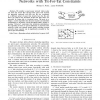Free Online Productivity Tools
i2Speak
i2Symbol
i2OCR
iTex2Img
iWeb2Print
iWeb2Shot
i2Type
iPdf2Split
iPdf2Merge
i2Bopomofo
i2Arabic
i2Style
i2Image
i2PDF
iLatex2Rtf
Sci2ools
104
click to vote
INFOCOM
2011
IEEE
2011
IEEE
Utility optimization for dynamic peer-to-peer networks with tit-for-tat constraints
— We consider a peer-to-peer network where nodes can send and receive files amongst their peers. File requests are generated randomly, and each new file can correspond to a different subset of peers that already have the file and hence can assist in the download. Nodes that help others are rewarded by being able to download more. The goal is to design a control algorithm that allocates requests and schedules transmissions to maximize overall throughput-utility, subject to meeting “tit-for-tat” constraints that incentivize participation. Our algorithm is shown to operate efficiently on networks with arbitrary traffic and channel sample paths, including wireless networks whose capacity can be significantly extended by the peer-to-peer functionality.
Related Content
| Added | 21 Aug 2011 |
| Updated | 21 Aug 2011 |
| Type | Journal |
| Year | 2011 |
| Where | INFOCOM |
| Authors | Michael J. Neely, Leana Golubchik |
Comments (0)

